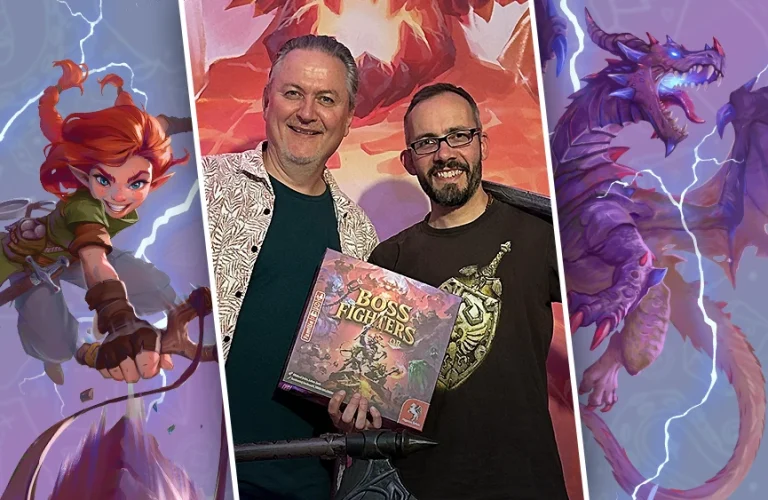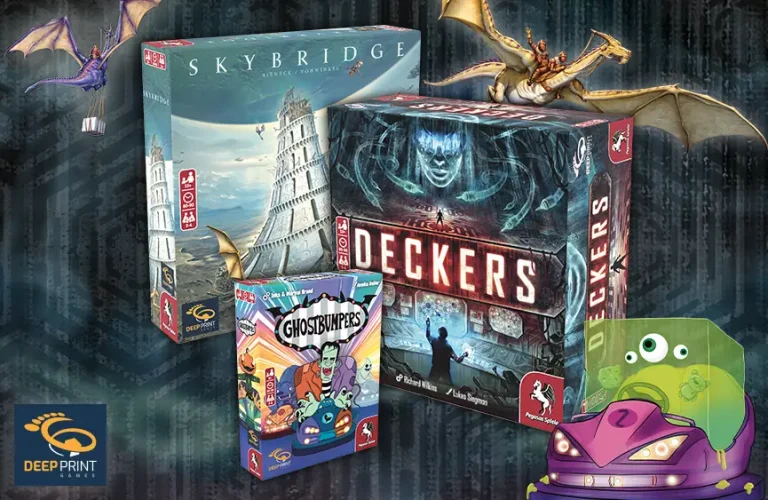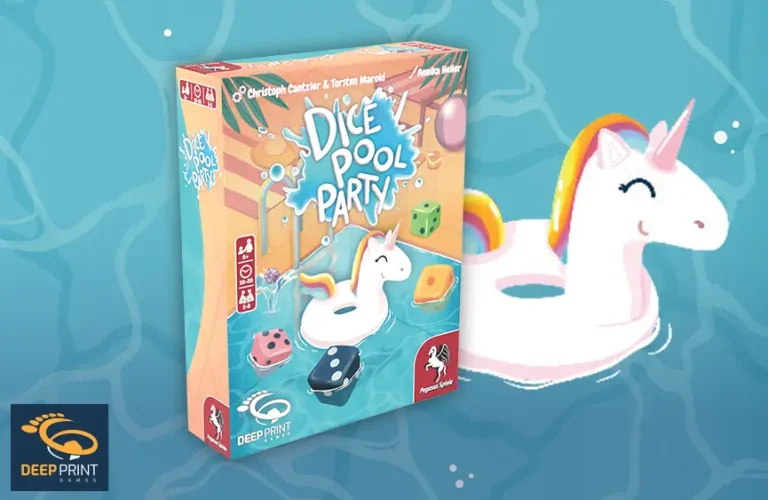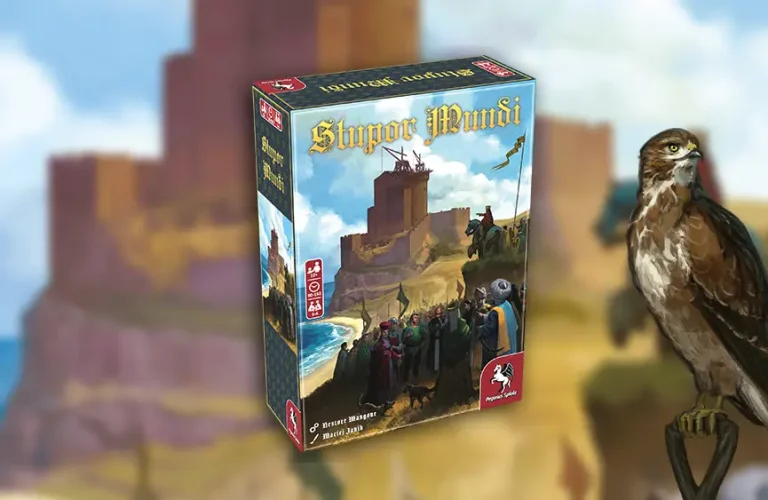Stefan Feld is well known for his mechanically ingenious Euro Games such as Bonfire, The Castles of Burgundy, and many more. However, civilization games have not yet appeared in his repertoire. With Civolution, which is based on a dice selection mechanism, this has now changed. Experience a complex Euro Game that unfolds over four eras (of 8 phases each), with a tech tree and countless possibilities thanks to 224 cards, but without face-to-face battles. In this interview, designer Stefan Feld and Viktor Kobilke, who edited the game, discuss the process of creating this title for publishing partner Deep Print Games, both the challenges and the joys of collaboration*:
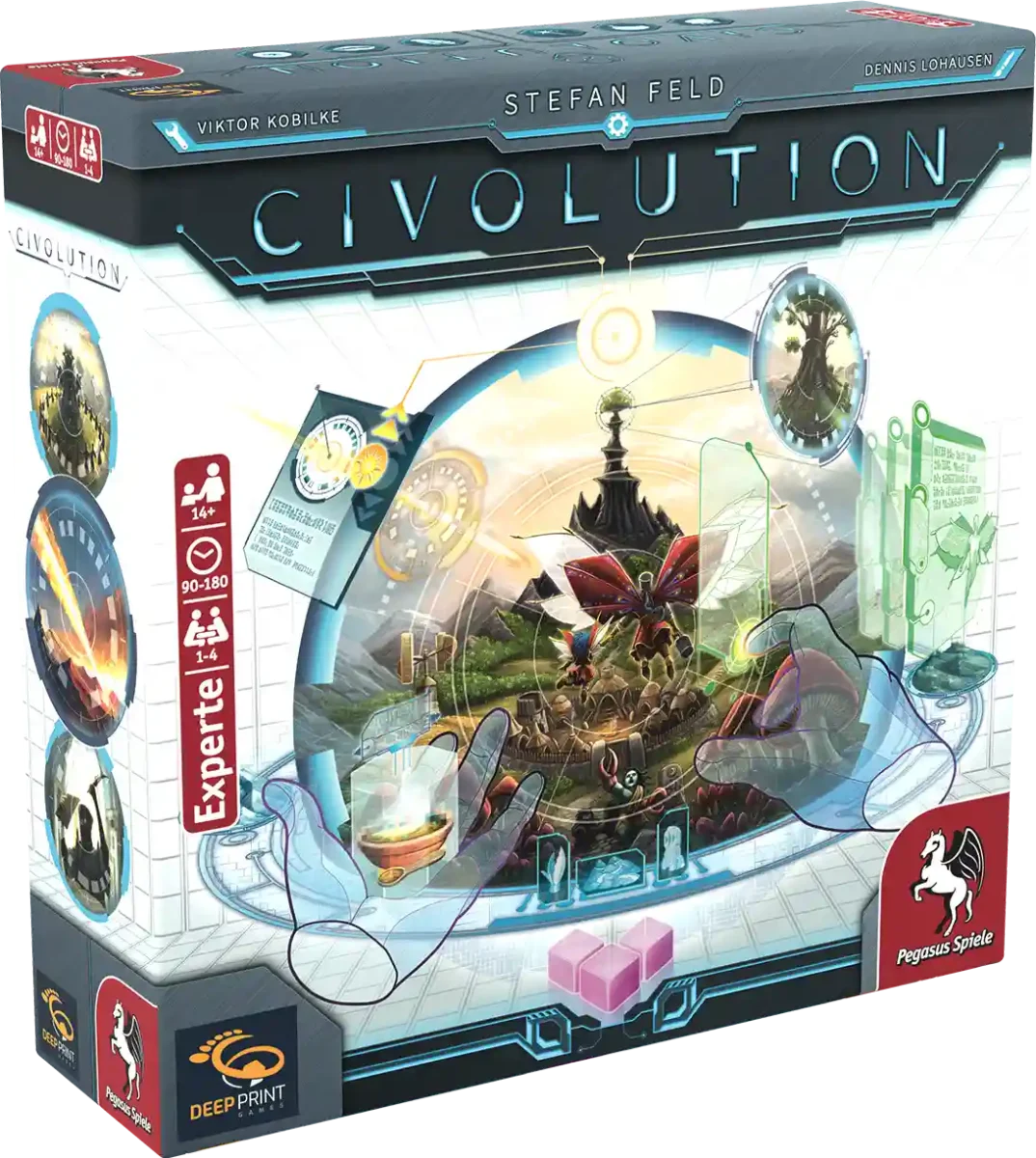
Stefan, when did you first have the idea for Civolution? How long had you been working on it before you showed it to anyone?
Stefan Feld: “Phew, that’s difficult to answer. I would almost say that was back in 2016 or 2017. Basically, everything had evolved around the dice mechanism in the game. I had it in my head for about two years before I spoke to Viktor and Matthias [editor’s note: Nagy] about it. But by then it had already become clear that this was not going to be a ‘small’ project with 21 possible actions, which were then tripled by Viktor. 😊“
Viktor Kobilke: “I also think we talked about the game for the first time in 2019. And in 2019 I was at a gaming get-together with Matthias, where you showed us a bit of the game.”
So, combining the dice to trigger the actions was the core mechanism? And did the mechanism just come to you as an idea at some point or did you sit down and think, I want to do something strategic with dice?
Stefan Feld: “It was clear that I wanted to do something with dice at some point. I designed a card game about 20 years ago, but it was never published, where you were dealt a certain number of cards in your hand and had to combine them. What was left in your hand then determined the subsequent actions. I gave up this game at some point but, in the end, I took up parts of it again and transferred them to the six-sided dice. The result is this game’s action tree.“
You said that you talked about Stefan’s game idea for the first time in 2019. In what context was that?
Stefan Feld: “I think the first time we actually talked about it was at Berlin Con 2019, but back then it was definitely without a theme. But Viktor and Matthias back then said yes, it could be something big and heavyweight. And since I had always dreamed of making something like a civilization game, preferably with evolutionary elements, I continued thinking in this direction. After that, I tinkered with it for about a year.”
Viktor Kobilke: “At the beginning of 2020, before Covid really kicked off, we played it for the first time at a gaming event.”
Stefan Feld: “Exactly, and it still had a lot of rough edges and was still quite aggressive. I remember, for example, that Peter [editor’s note: Eggert] was completely pushed off the plan by my son. Fortunately, Peter is a good sport. 😀 But the direction was already clear and it’s always very important to me that I first get feedback on whether a game is going in the right direction so that we can decide whether we should continue working on it or not.”
And when was the next time you played the prototype?
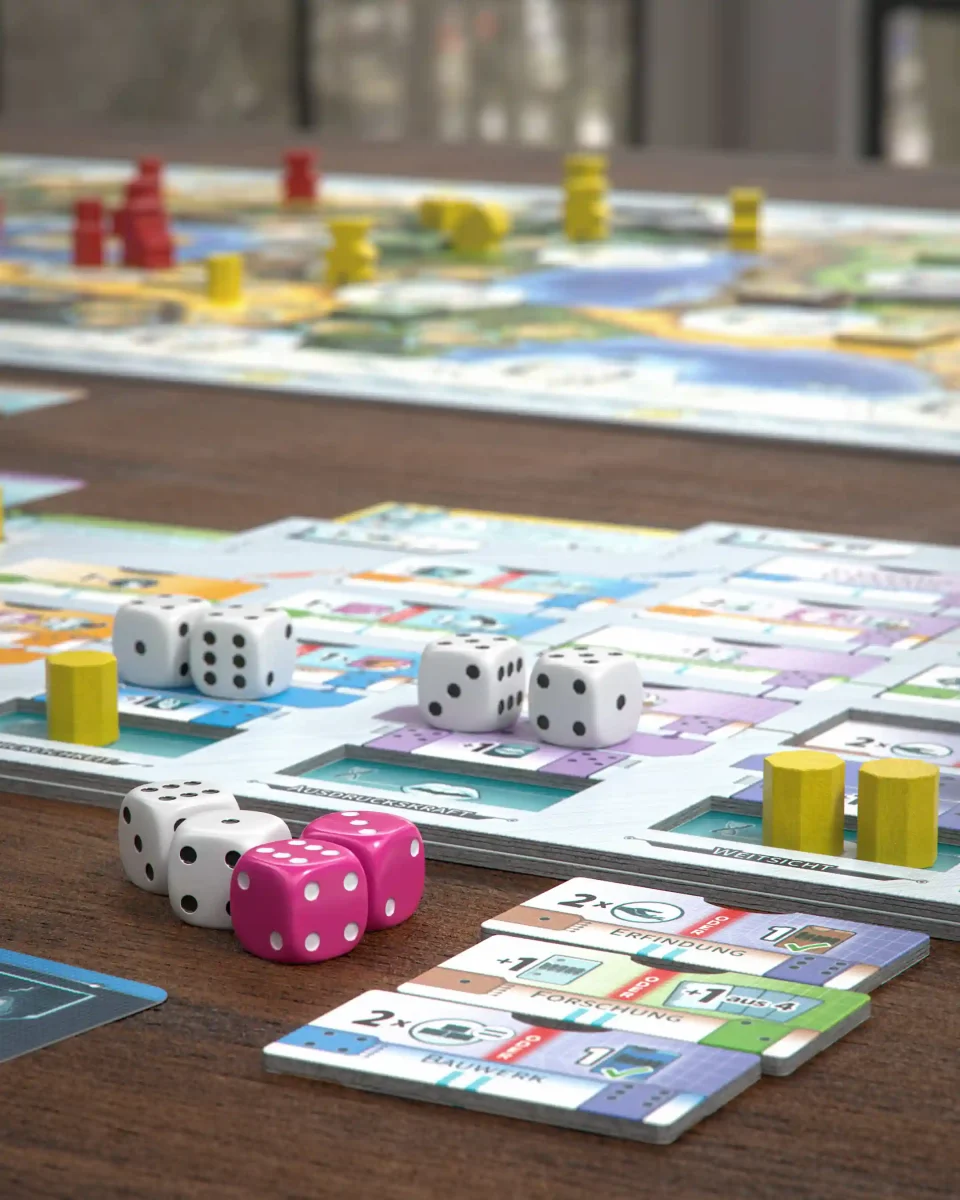
Viktor Kobilke: “I think we took it with us straight away. We also created a version of the game on Tabletopia, i.e. digitally, and continued testing it there. Stefan later sent me all the cards etc., which was around the middle or end of 2020.”
Stefan Feld: “Working with Viktor was also completely new for me. Usually, it’s more of a constant ping-pong with the editors, but here we worked on it in a completely different way: First I handed in a rough framework, then Viktor worked on it for a long time until it came back to me and so on. It was only in the final phase that we also had short-term consultations. That was unusual, but above all exciting and very efficient.”
But was it easy for you to “hand over the reins”?
Stefan Feld: “Viktor and I had already worked together for a short time on Forum Trajanum. So, it was already clear to me that the collaboration would work well. A certain amount of trust in each other is of course a precondition, as is the willingness to allow the other person to get involved when may really change something. You have to tame your own control compulsion a little here. But I don’t actually find that difficult, I see the finished game as a product of everyone involved. But you have to be able to let go. And sometimes an element is dropped and, if it was good per se, it comes back in another game.”
Deep Print Games was only officially founded in 2020. By then you had already “handed over” the game to Viktor. So, the game went where Viktor went?
Stefan Feld: “For me, this kind of collaboration only works on a relationship level. First and foremost, it simply has to be right between the people who work with me. That’s also why I’m the handshake type. I follow the motto ‘You’ve got it now and you make something of it and it will work out’. I have a kind of basic trust.”
And what do you think of the finished game now? You only played it for the first time in 2023 after a long break, didn’t you?
Stefan Feld: “Exactly! I actually think it’s sensational and it’s so, so much better than what I brought in as a rough draft back then. I think it’s really good now and I really enjoy playing it myself – always just for fun and never to win. But when I play with the gentlemen from Deep Print Games, I don’t stand a chance anyway. But it turned out to be exactly what I had hoped for, or rather what I had hoped for from a civilization evolution game. Especially thanks to the engine-building part that Viktor helped to develop.”
Viktor Kobilke: “That was actually one of the reasons for tripling the 21 actions. In other words, you don’t just have to hope for the luck of the draw, you can improve certain things yourself. Before, this was only possible via the cards that came randomly. Upgrading is of course one more step, but it gives you a lot of extra control to go in a certain direction.”
Stefan Feld: “And this change was a milestone! I sometimes underestimate that too, but many people, especially fans of expert games, just want to play ‘their thing’. But that’s often not possible with my designs because you don’t always get the cards. But that’s crucial for many people. As Viktor says, at least you now have the feeling that you have more control.”
Which aspect of the game development ultimately took the longest?
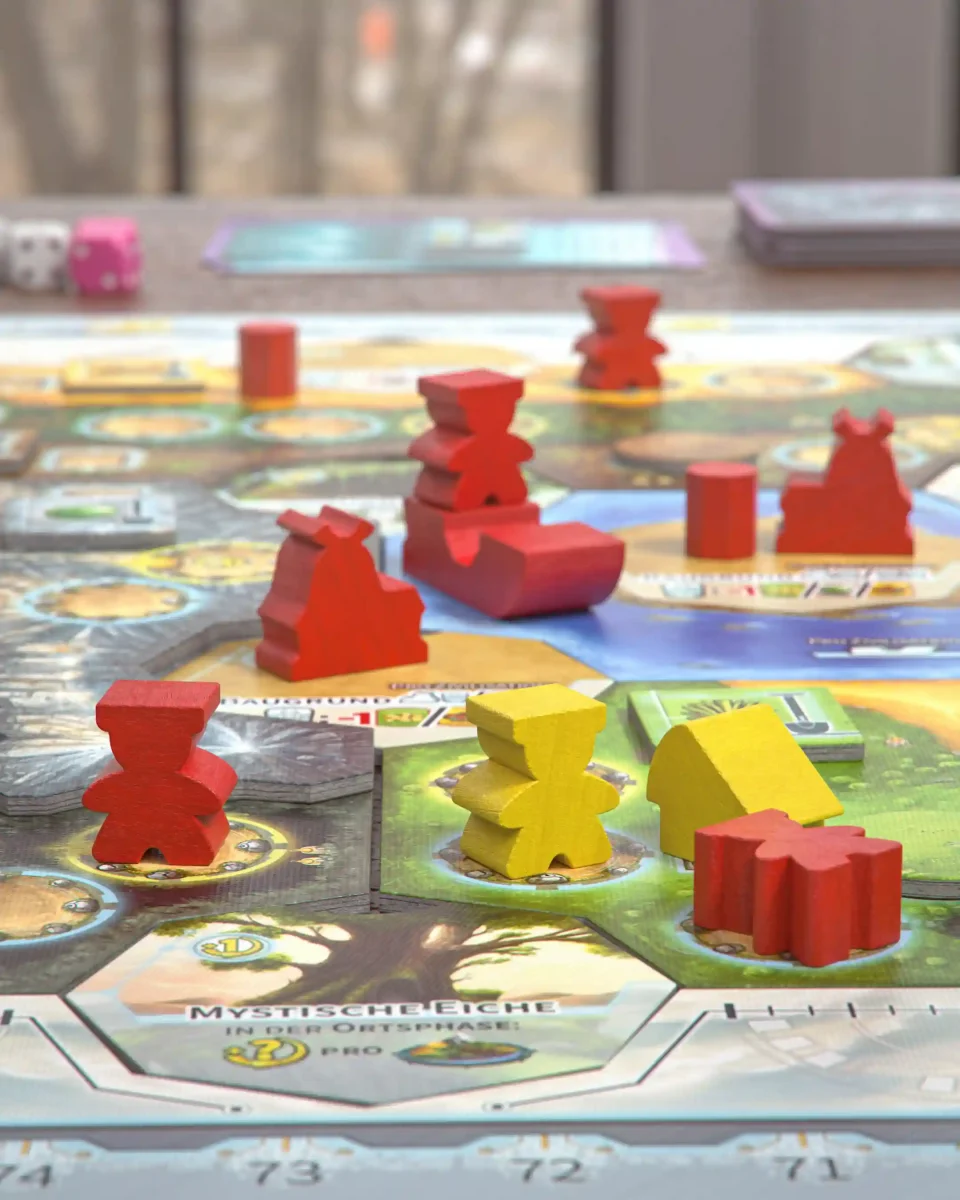
Stefan Feld: “I think we spent the longest time working on the displacement movement mechanism. We went through a thousand different approaches. I wanted a civilization game right from the start, but without the direct confrontation. It should definitely stay in the Eurogames area, but we had to adapt a few things compared to the first version, for example some cards.”
Viktor Kobilke: “Exactly, in the beginning there were 32 cards of each type and 32 events. Of course, we removed some of them and reorganised cards, but the principle was already in the very first prototype: Namely, that you have so many cards that all do something different and all have certain costs, based on the 18 resources. At some point, we came up with the idea of making how many resources you have to pay dependent on the number of rounds.”
Stefan Feld: “These 18 resources came about from a game mechanics point of view, of course, because they were six times three, but also because the things you build with the resources should be connected in a meaningful way. It was important to me to introduce civilization thematically and I even added a little flavour text for all the cards.”
And the idea that all of this is built into a console was there from the start?
Stefan Feld: “No, that came from Viktor, he already had it in his first self-made prototype. Originally it was a pyramid but fanned out the other way round. We then wanted to add lines that would give bonuses. Well, and then we just fiddled around a bit and rotated the rows by 90 degrees. That worked well and we stuck with it.”
Viktor Kobilke: “Originally, the cards weren’t that important. But my approach was that everything you get points for at the end be connected. And so, we ended up puzzling the cards into the console and triggering other things, so that everything was connected.”
Stefan Feld: ‘What has really improved the game experience is that you only get instant bonuses for many cards. That makes playing cards more attractive. In the beginning, I mainly got points for cards I played later. But now you also play cards to fill the console, even if the effect doesn’t do you much good at the moment. The collaboration between us was very effective here. Every brainstorming session was a real pleasure!’
In the end, Civolution has become a very complex game. Are you worried that people might find it ‘too much’?
Stefan Feld: “There will certainly be people who find it too complex. But the most important thing is that we don’t create any expectations in the wrong direction. But the game also contains elements of luck. Viktor once said to me that my games always work by throwing chaos at the players, which they have to somehow bring under control. But it was important to us that we only just reach the point where control is possible, but not the only aspect of the game. So, if you always roll the wrong dice, it will be difficult to win a game. But your own influence is great enough that if you know what you’re focusing on, you can still do well. And if you play several games, the better player will prevail.”
And you can always adjust your own course …
Viktor Kobilke: “Yes, absolutely. But that’s also what’s ‘dangerous’ about the game. I think a lot of people who lose often let themselves be guided too much by the dice. It’s risky to look at the dice and only take actions that fit the dice particularly well. It’s riskier than focusing on one thing and continuing to work on it. Getting too distracted by the dice, because so much is possible, is a trap you shouldn’t fall into. But even then, the game is still fun. Of course, there’s also a bit of luck that comes into play with the cards. Obviously, you can have a great starting hand, but it’s just not repeatable. And that’s the good thing about it for me: you have to read the conditions and somehow make the best of them. There are always combinations that I discover myself and then realize, wow, that combination is great. With so many possible combinations, it’s impossible to test them all perfectly in advance.”
Stefan Feld: “But it’s impossible to always meet everyone’s expectations. Viktor has already described it, there are so many possibilities and so many parameters in the game that there are naturally better and worse combinations in every game. It is then up to the players to read them. I am also prone to being distracted by the dice.;) But, and I think that’s the huge strength of the game: Of course you see the others moving away from time to time, but the extensive final scoring means that you never really know exactly where you’ll end up. So, you don’t get that feeling that the others are pulling away and nothing is going right for you. It’s a satisfying feeling, regardless of whether you’re ahead or not.“
Let’s talk about the illustrations by Dennis Lohausen: How far did you follow the process, Stefan?

Stefan Feld: “Viktor always showed me the latest status. I think I only spoke to Dennis about it very briefly once. But I had already worked with Dennis so much that I was very happy when Viktor said that Dennis would illustrate it. I knew that he would be able to realize the iconography that Viktor had developed very early on. What’s more, Dennis always comes up with great ideas thematically!”
And how do you feel about appearing in the game yourself?
Viktor Kobilke: “Yes, as director God, that’s great! 😊“
Stefan Feld: “Well, that’s nice for my ego, of course. 😉“
Viktor Kobilke: “I hadn’t asked if that was okay with him. But that was already clear relatively early on, or rather when we settled on the academy theme. The director of the Technical Academy of Creation is called Agera, which is derived from the Latin word, ager. Dennis had this funny idea, also with the matching illustration, and I thought, yes, why not? But I had the same problem with the solo mode, which we ended up calling V.I.C.I. after all. I didn’t know if I wanted to at first, but now I like it!“
Stefan Feld: “I mean, the publisher of Civolution isn’t called Deep Print for nothing. So we can leave our footprints behind.“
Thank you very much for the interview!
* The interview was held by Deep Print Games. We thank our publishing partner for their kind permission to publish it here.


